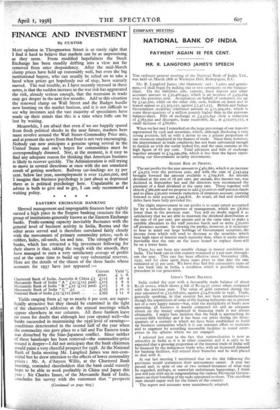COMPANY MEETING
NATIONAL BANK OF INDIA
PAYMENT AGAIN 18 PER CENT.
MR. R. LANGFORD JAMES'S SPEECH
THE ordinary general meeting of the National Bank of India, Ltd., was held on March 28th at Wesleyan Hall, Bishopsgate, E.C.
Mr. R. Langford James (the Chairman) said : Ladies and gentle- men,—I shall begin by making one or two comments on the balance- sheet. On the liabilities side, current, fixed deposit and other accounts amount to £30,466,945, which is an increase of £439,264 over the previous year. Acceptances on behalf of customers are up by £14i,5oo, while on the other side, cash, bullion on hand and in transit appear as £5,303,152, against £5,411,233. British and Indian Government securities combined amount to £15,304,062, which is some three-quarters of a million pounds higher than in the previous balance-sheet. Bills of exchange at £4,525,842 show a reduction of £283,592 and discounts, loans receivable, &c., at £10,073,727, small increase of £68,881.
When we last met I remarked on the large percentage of our deposits represented by cash and securities, which, although disclosing a very strong position, left us with a desire to see a greater proportion of our resources employed in the finance of trade. Since then, however, the improvement in trade conditions has not been substantial enough to furnish us with the outlet looked for, and the ratio remains at the high figure of 67 per cent. Total advances and bills of exchange together amount to £14,599,569, which is less than the figure repre- senting our Government security investments.
SLIGHT RISE IN PROFITS.
The net profits for the year amount to £465,861, which is an increase of £9,575 over the previous year, and with the sum of £243,954 brought forward the amount available is £709,816. An interim dividend at the rate of 18 per cent. per annum, less income-tax, was declared in September last and the directors now recommend the payment of a final dividend at the same rate. These together will absorb £360,000 and we propose to add £5o,000 to staff pension funds and to place £5o,000 towards reduction of premises account, carrying forward to next account £249,816. As usual, all bad and doubtful debts have been fully provided for.
The slight improvement in our profits is to some extent accounted for by a reduction in expenses of management, which are £6,600 lower than in the previous year. You will no doubt regard it as satisfactory that we are able to maintain the dividend distribution at the rate of 18 per cent. per annum and at the same time to make a suitable allocation to the staff pension funds and to write £50,000 off premises account. In viewing the profits, however, it is necessary to bear in mind our large holdings of Government securities, the income from which will tend to decrease as the securities which bear high rates of interest reach maturity date, when it seems almost inevitable that the rate on the loans issued to replace them will be on a lower basis.
There has not been any notable change in money conditions in India. The bank rate in that country remained at 3 per cent. through- out the year. This rate has been effective since November 28th, 1935, and for dose upon three years prior to that date the rate remained at 31 per cent. We have thus had five consecutive years of a low bank rate in India, a condition which is possibly without precedent in our generation.
II.•DIA'S TRADE BALANCE.
India ended the year with a favourable trade balance of about Rs.56 crores, which shows a fall of Rs.24.37 crores when compared with the previous year. The value of gold exported during the year amounted to £13,7o8,000, against £24,870,000 in 1936. Trade, generally speaking, in that country has not been unsatisfactory— though the experiences of some of the leading industries are at present not of a very happy nature—but, with the multiplicity of banks now operating, all business is keenly competed for and an adequate return on the money employed in financing trade is not always obtainable. I might here mention that the bank is approaching its seventy-fifth birthday and it has been our pride during the three- quarters of a century in which we have been established to build up business connexions which it is our constant effort to maintain and to augment by according reasonable facilities to sound enter- prises in the spheres where we are engaged.
I referred last year to the fact that nationalisation is now as attractive in India as it is in other countries and it is only to be expected that a growing proportion of the internal trade of India will be financed by the indigenous banks who, with an increased demand for banking facilities, will extend their branches and be well placed to deal with it.
At our last meeting I mentioned that on the day following the provinces would commence their autonomous career. A year has passed and, in spite of one or two isolated instances of what may be regarded, perhaps, as somewhat unfortunate happenings, I think you will join with me in congratulating the various Provincial Govern- ments on their handling of the tasks appointed to them. This excellent start should augur well for the future of the country.
The report and accounts were unanimously adopted.














































 Previous page
Previous page